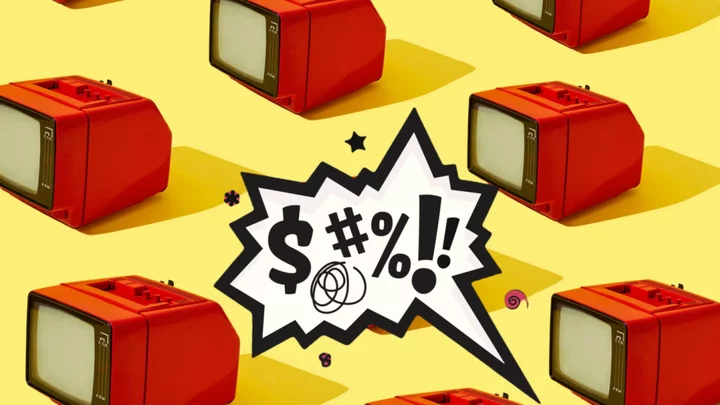In 1965, while appearing live on the BBC in England, theater critic Kenneth Tynan uttered the word f*** as a synonym for sexual intercourse. It was in the context of whether depictions of sex acts should be presented on film or television, and his usage of the word was seemingly more academic than provocative. Barring some overlooked slip on a regional station, it was more than likely the first time anyone had ever dropped an f-bomb on English language television.
The outcry was immediate. Among other complaints, one concerned citizen even wrote to Queen Elizabeth II and suggested Tynan “ought to have his bottom smacked.” Another viewer threatened to sue the BBC and the show’s producers and insisted that “a standard has got to be made.” A shamed BBC apologized, and TV would spend a few more decades operating under the idea that any profanity was unacceptable—on broadcast networks, anyway.
But was Tynan the cursing trailblazer? Does it matter if some other pioneering profanity was bleeped? And what about a scripted swear over a spontaneous expletive?
A F***ing Surprise
As you might expect, counterculture figures were far more likely to get on television and prompt controversy. In 1969, Jefferson Airplane appeared on The Dick Cavett Show the day after the seminal Woodstock music festival. In true iconoclastic fashion, singer Grace Slick had no reservations about singing “f***” and “motherf***er” in the song “We Can Be Together.” Because the show was taped, there was ample time to bleep the expletive, and it’s unclear whether the words actually made it on air: A cursory search of newspapers in the days following the broadcast reveals no public or critical outcry. (Cavett, incidentally, already had another first under his belt—guest Jerome Rodale, a health guru, expired while talking to the host. Naturally, that segment didn’t see the light of day.)
In 1975, John Lydon, a.k.a. Johnny Rotten of the Sex Pistols, appeared on ITV’s Today program and dropped a few “f***s” in dialogue with host Bill Grundy. Such was the intolerance for such blue language that Grundy himself was suspended for two weeks and the show canceled two months later—even though it wasn’t even Grundy who had said it.
There’s also been ample f-bomb spontaneity on Saturday Night Live. Paul Schaffer let a “f***” slip in 1980, his final year as a member of the sketch show’s house band; cast member Charles Rocket also delivered one during a sketch the following year, as did guest musical act Prince. Rocket’s, which seemed accidental, got him fired; Prince escaped any controversy.
Sticking to the Script
While live television played host to gaffes, scripted series had to be measured in their language. You were unlikely to hear any f-bombs or even too many darns coming from Ward Cleaver. But actress Doris Packer did manage a “damn” on a 1965 episode of My Favorite Martian. (After being given a watch, she exclaims, “Damn thing probably doesn't even keep time.”) And on Star Trek (1966-1969), William Shatner’s James T. Kirk was fond of the word hell, as in, “Let’s get the hell out of here.” Colleague Doctor McCoy spewed “Dammit, Jim” to reinforce his curmudgeonly nature. In the context of scripted naughty words, that was about as far as Kirk and company could push it.
The same was true of networks, who were forced to sit idle and be mindful of Federal Communications Commission (FCC) prohibitions on language even as cable networks like HBO aired R-rated films and raunchy original shows that began stealing some of network television’s audience during the cable boom of the 1980s. It wasn’t until NYPD Blue in 1993 that ABC started loosening the restrictions. The cop drama created by Stephen Bochco doled out profanity and nudity in HBO-light doses, prompting some ABC affiliates to refuse to air the show.
Despite blowback, broadcast standards were clearly loosening. In 1999, CBS permitted the medical drama Chicago Hope to retain a line spoken by Mark Harmon’s Dr. Jack McNeil, who, after a botched operation, told malpractice attorneys that “s**t happens.” It was likely the first time the word had appeared in a scripted program.
Basic cable leniency followed, with shows like South Park, The Shield, and others upping the profanity quotient. (South Park cheerfully repeated “s**t” 162 times in one episode following Chicago Hope breaking down the barrier.) Today, you can hear coarse dialogue virtually anywhere on the dial, up to and including the once-verboten f-word. In one 2018 episode of the FX show Mayans M.C., it was dropped over 20 times.
But thanks to FCC guidelines and skittish advertisers, f*** remains the final frontier for the broadcast networks. The popular NBC comedy The Good Place (2016-2020) even had some meta fun with the restriction, having Kristen Bell unable to say it in the afterlife: It would come out as fork instead. Would a primetime show get away with it in 2023? Eventually, someone may fork around and find out.
Related Tags
TELEVISION LANGUAGE WORDS SEX CULTURE Pop Culture NEWS ENTERTAINMENT History TVEditor's Picks
8 Weird Disasters from History
Did the Bouncing DVD Logo Ever Actually Hit the Corner of the Screen?
4 of the Best Ergonomic Office Chairs, According to Experts
Celebrate National Cinema Day This Sunday With $4 Movie Tickets—Here's What to Know

